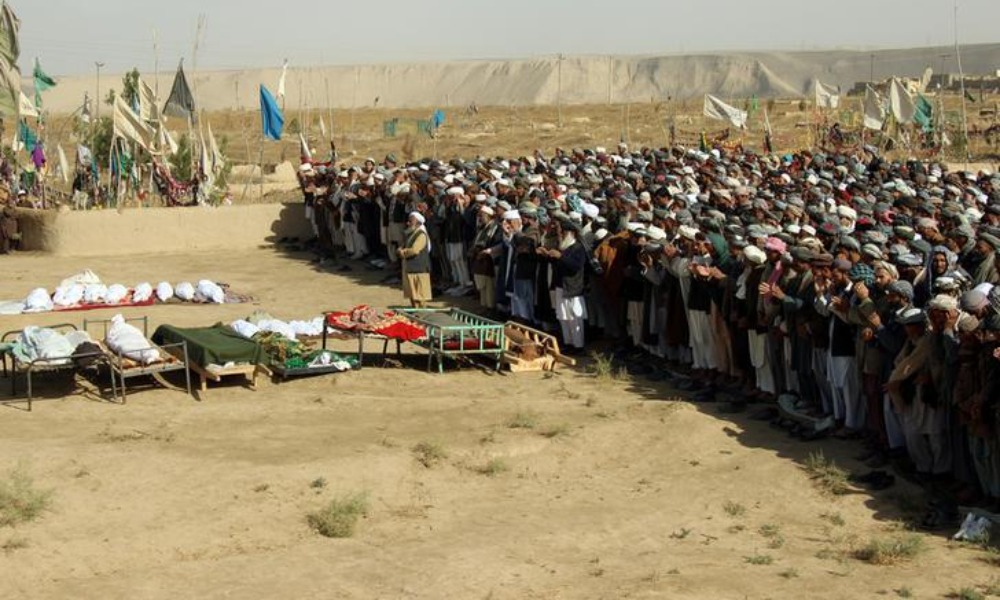Latest News
Rights watchdog reports hundreds killed so far during Ramadan

The Independent Human Rights Commission (IHRC) says that during the month of Ramadan so far (April 13 to May 7), 130 security incidents were recorded resulting in 519 civilian casualties.
According to the commission, 160 people were killed and 351 others were injured in security incidents during Ramadan.
This does not however include the casualties in Saturday’s explosion in Dasht-e-Barchi in Kabul, which killed at least 63 people and wounded 187.
By adding the statistics of the victims of the explosions in the west of Kabul, the civilian death toll totals more than 220 with over 500 injured.
This comes after the Interior Ministry said, at least 243 civilians including women and children were killed and injured between April 15 and April 25 in Taliban attacks and IED explosions.
According to the ministry, in this time, the Taliban carried out six suicide bombings and detonated 62 landmines in which civilians including women and children were killed and financial losses were inflicted on the public and the government.
The MoI blamed the Taliban for the escalated violence, and in response, Afghan national defense and security forces killed key Taliban commanders and members in separate operations.
Fighting between Afghan security forces and the Taliban has also intensified in many part of the country in the past few weeks – with Helmand, Ghazni and Baghlan being the hardest hit.
Thousands of civilians have fled their homes around the Helmand capital of Lashkargar as fighting intensified around them last week.
On Wednesday, General Sami Sadat, commander of Maiwand Corps, said that the Taliban had carried out 89 attacks in different parts of Helmand province, and that all of the attacks were met by force from the Afghan security forces. He said the Taliban sustained heavy casualties.
“The morale of the Afghan forces is high and they have access to good equipment and with the available equipment they can defeat the Taliban,” Sadat added.
Latest News
Continued aid to Afghanistan vital for regional security: Kazakh president

Kazakhstan’s President Kassym-Jomart Tokayev has emphasized the continuation of humanitarian assistance to Afghanistan, stating that the ongoing provision of such aid plays an important role in ensuring regional security.
Speaking at the international conference “Peace and Trust” in Ashgabat, the capital of Turkmenistan, Tokayev described addressing complex humanitarian challenges and the reconstruction of Afghanistan as a necessity.
“To ensure regional security, we consider it essential to continue providing assistance to Afghanistan, including by strengthening international efforts to address complex humanitarian issues and the reconstruction of this country. Kazakhstan remains committed to supporting the people of Afghanistan through humanitarian aid, educational projects, trade development, and food security initiatives,” he said.
Meanwhile, experts believe that sustainable improvement of the humanitarian situation in Afghanistan requires broad cooperation from the international community and support for the country’s economic development.
“Investment can be defined as one of the fundamental drivers of the economic cycle, and whenever Afghan traders do not take their money out of the country and instead invest domestically, it naturally leads to greater growth and dynamism in Afghanistan’s economy,” said Abdul Zahoor Modabber, an economic analyst.
As the humanitarian crisis in Afghanistan continues, reports by international relief organizations indicate that millions of citizens of the country are in urgent need of food, health, and livelihood assistance.
The reduction in funding for aid organizations, the impacts of climate change, and the return of migrants have increased concerns about a further deterioration of the humanitarian situation in the country.
Latest News
Islamic Emirate declines to attend Tehran meeting on Afghanistan
Latest News
Sirajuddin Haqqani: A government that intimidates its people is not a true government

Khalifa Sirajuddin Haqqani, Minister of Interior of the Islamic Emirate of Afghanistan, said during a visit to Khost province on Friday that any government which rules through fear cannot be considered a true government.
“A government is one that is loved by its people, one that serves them with respect and compassion, and from whose behavior people learn ethics and sincerity,” he said.
Haqqani also stressed that Afghans who opposed the Islamic Emirate in the past should be tolerated and treated in a way that helps eliminate hostility and animosity, paving the way for national cohesion.
-

 Sport4 days ago
Sport4 days agoILT20: Desert Vipers edge Gulf Giants in historic super over thriller
-

 Latest News2 days ago
Latest News2 days agoMuttaqi: Afghanistan’s progress requires both religious and modern education
-

 Regional4 days ago
Regional4 days agoSix Pakistani soldiers killed in TTP attack in Kurram District
-

 Business4 days ago
Business4 days agoTrade bodies warn almost 11,000 Afghan transit containers stuck at Karachi port
-

 World4 days ago
World4 days agoPowerful 7.6 earthquake hits northern Japan, tsunami warnings issued
-

 Latest News3 days ago
Latest News3 days agoTrump calls Afghanistan a ‘hellhole’ country as US expands immigration restrictions
-

 Sport5 days ago
Sport5 days agoSorkh Poshan Khafi defeats Sarsabz Yashlar 4-0 in Afghanistan Champions League
-

 Sport3 days ago
Sport3 days agoCommanding wins for Arman FC and Sarsabz Yashlar in Afghanistan Champions League

























